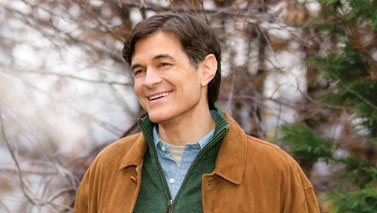One of America’s most celebrated cardiothoracic surgeons, Mehmet Oz, MD, FACS, has saved hundreds of lives with his deft surgical skills and his sage health advice. But the best-selling author and Oprah regular claims that you — not your physician — are the key to improving your health.
“You have the ability to do something I can’t do,” Oz says. “Your health is about you, and only you can work on it.
But if you don’t have a clue where to start, Oz isn’t surprised — and he believes he and his fellow physicians are partly to blame. “Part of the problem is that people aren’t getting this message because we aren’t getting it to them,” he says.
Doctors train for years to diagnose illnesses, remove appendixes and reset broken bones, yet they get virtually no training in how to talk with patients about improving their health. The doctor-patient relationship, he continues, is “so much around what I can do for you as a doctor and not about what you can do for yourself even better.”
This information gap between doctors and patients has reached a critical mass. “America thinks that if something isn’t working, you can get an operation or medication,” he says. “I’ve operated most of my life on about 400 people a year. That’s 10,000 hearts in a lifetime. And that is a drop in the bucket of the bigger [healthcare] problems facing America.”
So this surgeon set out to become a doctor who talks. After hearing from patients that he had a knack for explaining health information in a way that helped them understand it, he and his wife, Lisa, a television producer, launched Second Opinion With Dr. Oz, a series that appeared on the Discovery Health Channel in 2003. Auspiciously, his first guest was Oprah Winfrey.
Soon, he was making appearances on her show and reaching a national audience. Yet he wanted to ensure his message was really reaching people. “How would I emphasize that something is important? I would give it an owners’ manual,” he says. “Everything else that’s important in life has one.” So he did, coauthoring with Michael Roizen, MD, the best-selling YOU: The Owner’s Manual (HarperCollins, 2005), which turned out to be the first in a series of YOU: books.
“When you appreciate the spectacular machine you own, you become more aware of what you are doing to it,” he says. “Just ask yourself: Would you feed someone else the food you just ate? Force them to work the job you work? Would you be unhappy with someone who just did what you did?”
A professor of surgery at Columbia University in New York, the 47-year-old Oz splits his time between the classroom, the hospital, media appearances, writing projects and family duties at his New Jersey home that he shares with his wife and four children. Which is another way of saying he’s a pretty busy fellow. So how does he follow his own advice and stay healthy and balanced?
For one, he rigorously guards his schedule. “I’m very jealous about my time, so I’m a very automated guy,” he explains. “I’m in bed by 11:00; up by 5:45. And I don’t waste time during the day. My advice to anybody who wants to succeed is to have a routine.” That way, he continues, you don’t have to waste time thinking about what your routine will be.
And that includes packing his meals and snacks. “I always bring food from home,” he says. “I want to feel good every day, so I never put anything in my mouth that won’t encourage that — and I won’t cheat on that.”
He recommends that half of everything we eat should look like it did when it was harvested. His personal favorites? “I never go anywhere without nuts,” he says.
He also starts every morning with a brief yoga set. “First, I bend at my waist and relax, then do a sun salutation. Then I keep one leg in the air and do 20 pushups on each side. Then I do the triangle pose. It all takes only seven minutes,” says Oz. “I don’t do it to get big or bulky. It just warms me up and I’m ready to go.”
What really keeps Oz centered and balanced, though, is his family. “My relationships with my wife, my kids, my best friends — these, for me, are inviolable relationships,” he says.
He likens strong family ties to having a personal safety zone. “No matter who gets mad at me for what, I have my fortress,” he says. “They make sure that my inner core is safe and healthy.”

This Post Has 0 Comments